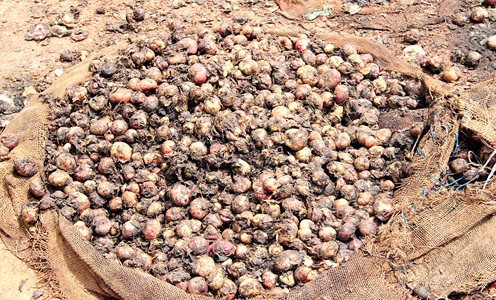
GH¢3.1 million worth of onions rot at Adjen Kotoku Market
Fifteen truckloads of onions valued at GH¢3.1 million have gone to waste at the Adjen Kotoku Onion Market in Accra, following weeks of transportation delays, poor road networks and inadequate storage facilities.
The situation began a few weeks ago when several trucks carrying onions from Nigeria arrived late at the market after long and difficult journeys.
Many of the onions had already begun to rot in transit due to heat, poor ventilation and extended travel time.
The heavy rains that followed worsened the condition of the onions, as moisture seeped into the sacks, accelerating spoilage.
Situation in the area
When the Daily Graphic visited the market yesterday, most of the traders were seen counting their losses as they stood helplessly beside heaps of rotten onions.

The piles of rotten onions were spread across the market, releasing a pungent stench that had permeated the entire area.
Many traders looked visibly distressed as they tried to salvage what was left of their produce.
Cause
The Spokesperson for the Onion Traders Association, Osman Mohammed Sidi, said the massive spoilage was largely due to the long journey the onions travelled from Nigeria and the poor quality of the imported produce.
“The reason for the damaged onions this season is mainly due to the long journey they make from Nigeria to Ghana.
The onions we import are mostly from Kano, not Sokoto, and the Kano variety is generally less strong,” he explained.
Mr Sidi said the traders had no choice but to rely on onions from Kano this season because of shortages from Niger, Sokoto and Burkina Faso.
“The trip from Kano to Ghana takes about eight to 10 days, and if a truck breaks down, it can take up to 12 days. For onions, even a one-day delay can be disastrous as they start to spoil quickly.
That’s why many of the onions arrived here in bad condition,” he said.
He added that locally produced onions were also affected because most Ghanaian farmers did not cultivate them for long-term storage. “Once they harvest, they expect ready markets.
But when there’s no immediate demand, the onions begin to rot.
This year, after harvesting, the rains also started and that worsened the damage,” he said.
Everything gone
Mr Sidi said some farmers and traders had lost everything, with a few even considering selling their property to recover from the losses.
“We’re appealing to the government to come to our aid. Farmers need proper training in onion cultivation and, more importantly, access to good storage facilities so that when there’s no ready market, they can keep their onions for longer periods without losses,” he appealed.
He also lamented that the relocation of the market from Agbogbloshie to Adjen Kotoku had worsened their plight.
According to him, the poor road network leading to the new site had discouraged buyers from coming, unlike at the old market where even damaged onions were purchased for processing.
“Previously, when we were at Agbogbloshie, buyers would come for the damaged onions to blend and use.
But now, because of the poor road network to this new location, buyers hardly come.
That’s one major reason many traders are struggling,” he added.
Excessive fertiliser use
One of the affected traders, Shaibu Ibrahim, recounted his personal loss.
“I lost a whole truckload of the Nigerian variety from Kano, about 420 bags.
We expected to sell each bag for between GH¢1,000 and GH¢1,300, but unfortunately, we couldn’t even make enough to pay the transport fees.”
“We had to plead with some of the drivers to give us time to pay them back because we made no returns at all,” he said.
He added that some local onions were also wasted before reaching the market because excessive use of fertiliser made them larger but less durable.
“Many farmers focus on quantity instead of quality and that affects the onion’s shelf life,” he said.
He called for investment in quality production and proper post-harvest management.
“If we concentrate on quality, things will improve. I sometimes import onions from Egypt, Morocco, and China; they travel long distances, yet they don’t spoil. You can store them for two months and still find them fresh, thanks to of their quality.
That’s where we need to learn from, focus on quality, not quantity,” he said.
No insurance
Mr Ibrahim further explained that there was no form of insurance or government support for traders in the onion business.
“The risk involved in this business is very high, so insurance companies are reluctant to cover us.
A truck can break down on the road or rain can destroy the onions before they arrive.
Once water gets into the load, it starts to rot, especially with the long distance from Kano to Ghana,” he said.
